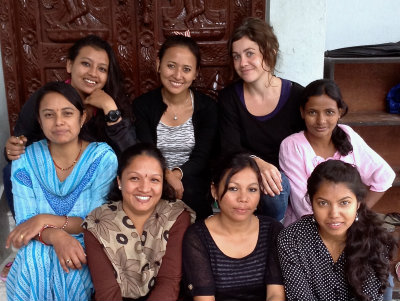
When I decided to make the move from working in a child protection team in London to the mountains of Nepal I never dreamed it would lead to me setting up my own business.
Yet here I am, one year later and the founder of Ama Himalaya.
It’s pretty simple really – I find beautiful things to buy in Nepal and sell them in London.
It might sound like business but to me it’s still social work – just a different kind of social work.
For me social work has always been about change – supporting others to make changes either for themselves or their family. And that’s exactly what Ama Himalaya is all about-supporting others to make changes.
Nepal has a long and wonderful history of craft. I discovered just how wonderful when I was shopping in Kathmandu for Christmas presents. I was especially excited when I found a few organisations employing women to make beautiful pashminas shawls, cashmere ponchos and scarves.
I sent a box load of pashminas home and afterwards got emails from friends asking me to send them some more. This got me thinking – could there be demand to sell these in London?
So I went and found out more about these organisations. I really wanted to know why it was their mission to employ women. In meeting the workers I also met some truly inspirational women and came to learn more about Nepali society, culture and traditions.
Like many other countries in this part of the world, society here is very patriarchal and many of the traditions practised perpetuate gender inequality.
For example, many girls receive an inferior education compared to boys and leave school earlier. In some remote areas they still practice a custom that forces women to live in the stable while menstruating and after giving birth.
Domestic violence seems to be frighteningly common and sexual violence is a regular occurrence. I have seen sexual harassment dismissed as a normal part of life for women.
Trafficking of young girls into the sex trade is a huge problem and in the last 18 months alone the country has seen a 60% growth in human trafficking. It’s mostly girls from poor, rural areas who are sold and trafficked within Nepal and India where they may be forced into sexual slavery.
Whilst there is a growing awareness of, and movement towards, equality for women, very few have any sort of independence at the moment.
Most of those whom I met told me their jobs were so important to them because it gave them a little bit of independence and with independence came the ability to make choices. They might only be small choices but it was the fact that they could make a choice that was important to them.
So to me it seemed obvious that if I could buy the products from these women and find a way to sell them in London it would give them a reliable income, security and help them develop skills.
Eventually I hope to reinvest a part of the profits into local organisations that support survivors of sex trafficking.
So with the story of these women behind this venture it made perfect sense to call it “Ama” which means “mother” in Nepali. Products made by women that can help them, and other women, change their lives.
Read Lizzie Lake’s article on why she left her job as a child protection social worker in the UK to move to Nepal


 Bournemouth, Christchurch and Poole
Bournemouth, Christchurch and Poole  Hampshire County Council
Hampshire County Council  Lincolnshire County Council
Lincolnshire County Council  Norfolk County Council
Norfolk County Council  Northamptonshire Children’s Trust
Northamptonshire Children’s Trust  South Gloucestershire Council
South Gloucestershire Council  Wiltshire Council
Wiltshire Council  Wokingham Borough Council
Wokingham Borough Council  Children and young people with SEND are ‘valued and prioritised’ in Wiltshire, find inspectors
Children and young people with SEND are ‘valued and prioritised’ in Wiltshire, find inspectors  How specialist refugee teams benefit young people and social workers
How specialist refugee teams benefit young people and social workers  Podcast: returning to social work after becoming a first-time parent
Podcast: returning to social work after becoming a first-time parent  Podcast: would you work for an inadequate-rated service?
Podcast: would you work for an inadequate-rated service?  Family help: one local authority’s experience of the model
Family help: one local authority’s experience of the model  Workforce Insights – showcasing a selection of the sector’s top recruiters
Workforce Insights – showcasing a selection of the sector’s top recruiters 

 Facebook
Facebook X
X LinkedIn
LinkedIn Instagram
Instagram
Comments are closed.